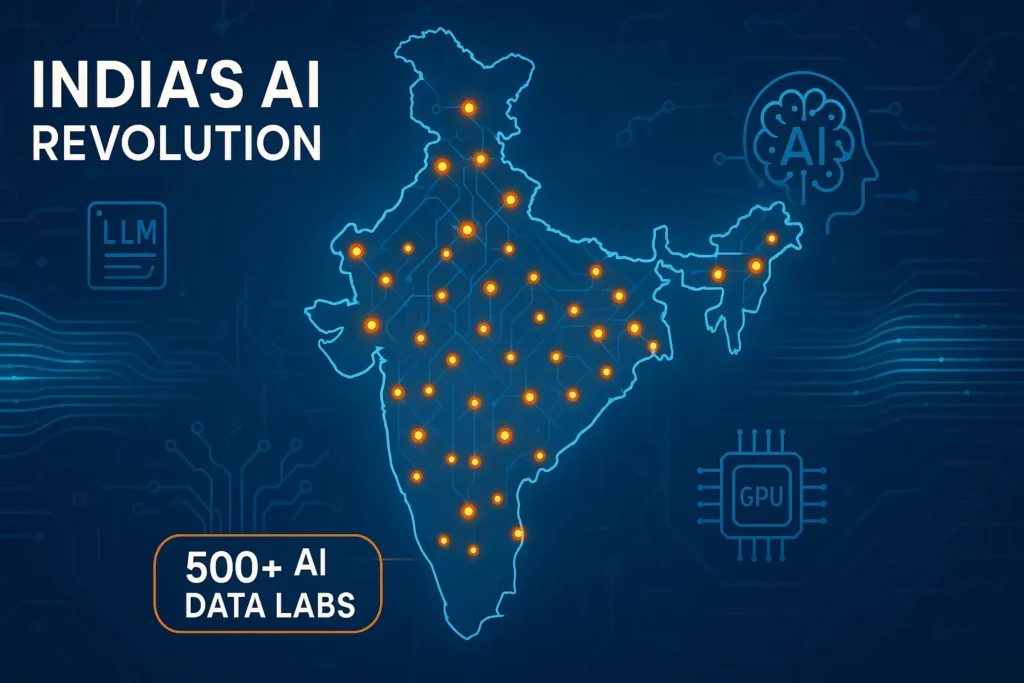India is making a significant push to become a global leader in artificial intelligence (AI). At a pre-event for the AI Impact Summit 2026, Union IT Minister Ashwini Vaishnaw announced the ambitious IndiaAI Mission, a Rs 10,300 crore initiative designed to build domestic AI capabilities, strengthen infrastructure, and develop skilled talent across the country.
The mission is a cornerstone of India’s strategy to harness AI for economic growth, innovation, and technological self-reliance while reducing dependence on global AI models.

Key Highlights
- Over 500 AI data labs to be set up nationwide to enhance AI research and infrastructure.
- National AI governance framework to be launched within 10 days for safe and ethical AI deployment.
- Sovereign Large Language Models (LLMs) to be developed by eight new partners, including IIT Bombay’s 1-trillion parameter model.
- Sector-specific small language models (SLMs) targeting agriculture, manufacturing, weather forecasting, logistics, and transportation.
- GPU expansion from 34,000 to 44,000+ units to support AI research.
- Funding allocated for AI startups and accelerators to spur innovation across priority sectors.
500+ AI Data Labs Nationwide
A central pillar of the IndiaAI Mission is the creation of over 500 AI data labs across India. These labs will provide researchers, startups, and enterprises with advanced compute resources and curated datasets, enabling hands-on experimentation and innovation.
By March 2026, around 200 labs are expected to be operational, with the remaining labs coming online in phases over the next two years. The data labs will particularly benefit tier 2 and tier 3 cities, offering access to AI tools and resources that were previously limited to major urban centers.
These labs aim to bridge the gap between academic research and real-world applications, nurturing an ecosystem that supports startups, research institutions, and industrial AI projects.
National AI Framework for Safe and Ethical AI
Alongside the labs, the government will launch a national AI governance framework within the next 10 days. Developed by the Ministry of Electronics and Information Technology (MeitY) in collaboration with the Office of the Principal Scientific Adviser, the framework will provide guidance on safe, ethical, and responsible AI use.
The framework will define principles for AI deployment, including risk management, societal impact, and mechanisms for mitigating harm. While not legally binding, it will serve as a roadmap for companies, startups, and research institutions to ensure AI development aligns with public interest and ethical standards.
Vaishnaw emphasized the global importance of cooperation, stating, “The world has to come together for a common governance framework for AI. Will it result in a framework in a year? I don’t know.”
Sovereign Large Language Models (LLMs)
Another significant initiative under the IndiaAI Mission is the development of sovereign large language models (LLMs). These are AI models trained on Indian datasets and languages, designed to reduce reliance on global models and better reflect India’s cultural and linguistic diversity.
Eight partners have been selected to contribute to this effort, including Tech Mahindra, Fractal Analytics, and BharatGen (an IIT Bombay consortium). IIT Bombay’s proposed LLM is expected to have 1 trillion parameters, with Rs 988.6 crore allocated to its development. In AI terms, ‘parameters’ are the internal variables a model learns from training data, capturing patterns and relationships in language.
The mission also plans to develop sector-specific small language models (SLMs) for industries such as agriculture, manufacturing, logistics, weather forecasting, and transportation. These models will help solve practical, industry-specific challenges using AI.
📌 Read More
GPU Expansion for AI Research
To support the heavy computational needs of LLMs and SLMs, IndiaAI Mission CEO Abhishek Singh has been directed to explore an expansion of the current 34,000 GPUs by an additional 10,000 units.
GPUs (Graphics Processing Units) are critical for AI because they allow parallel processing of vast amounts of data, enabling the training of complex models like LLMs. The planned expansion will enhance India’s capacity to train large-scale models domestically, strengthen the AI ecosystem, and accelerate innovation.
AI Skilling and Startups
The IndiaAI Mission is not just about infrastructure—it also emphasizes human capital development. Over 10 lakh citizens will be trained in AI, machine learning, data analytics, and cybersecurity, including free AI training for rural workforce through 5.5 lakh Common Service Centres (CSCs).
Additionally, the government is earmarking funds for AI startups and accelerators, ensuring that innovation is supported across sectors. This combination of infrastructure, talent, and funding is designed to create a sustainable domestic AI ecosystem.
Global and Regional Impact
India’s efforts under the IndiaAI Mission have global significance. By focusing on sovereign AI models, ethical governance, and widespread skilling, India is contributing to a responsible AI ecosystem that could serve as a model for other nations.
The development of indigenous LLMs ensures that AI tools can better understand local languages, cultures, and industries. This can reduce reliance on international AI providers, enhancing India’s technological sovereignty and setting a precedent for other regions looking to balance innovation with cultural relevance and ethical standards.
Furthermore, the mission’s focus on sector-specific models aligns with global trends in AI deployment, particularly in agriculture, logistics, and manufacturing, which are vital for food security, supply chains, and industrial growth worldwide.
Conclusion
The IndiaAI Mission represents a bold step forward in building a strong domestic AI ecosystem. By establishing over 500 AI data labs, launching a national AI framework, developing sovereign LLMs and sector-specific SLMs, expanding GPU resources, and investing in human capital, India is positioning itself as a global leader in AI.
These initiatives are not only expected to enhance India’s technological capabilities but also ensure that AI benefits are inclusive, ethical, and culturally relevant, paving the way for innovation that resonates both locally and globally.
With these measures, India is setting the stage for a future where AI drives economic growth, empowers citizens, and contributes meaningfully to the global AI landscape.



